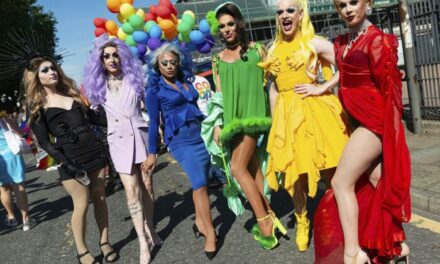In a courtroom showdown that has left heads spinning, journalist Carol Cadwalladr has been ordered to pay damages to Arron Banks in a high-profile libel trial. Banks accused Cadwalladr of making false claims about his alleged ties to the Russian government, leading to a verdict against the imaginative journalist. Seizing the opportunity to express her discontent, Cadwalladr lamented, “It’s a dark day for journalism when we have to stick to facts and can’t just make things up.”
Known for her imaginative storytelling, Cadwalladr has been a controversial figure in the media landscape. Her narratives often strayed from the realm of reality, captivating audiences with tales that seemed more fictional than factual. However, this time her embellishments proved costly, as the court found her claims baseless and damaging to Banks’ reputation.
Cadwalladr’s response to the verdict has raised eyebrows and prompted puzzled reactions. She voiced concern over the future of The Guardian, the esteemed publication she represents, stating that their very existence hangs in the balance if they are forced to adhere to the truth. Could it be that the newspaper’s survival is contingent upon fabrications and falsehoods?
Critics of Cadwalladr’s storytelling approach argue that journalism should be rooted in facts and integrity. They contend that the public has a right to accurate information, and journalistic credibility should not be sacrificed for the sake of sensationalism. However, Cadwalladr and her supporters defend her right to freedom of expression, suggesting that her narratives add colour and excitement to the news landscape, regardless of their veracity.
This libel trial and Cadwalladr’s subsequent statements have sparked a heated debate about the role of journalism in society. Should journalists be held accountable for spreading misinformation and unsubstantiated claims? Or should they be granted artistic license to spin tales that captivate audiences, even if they deviate from the truth?
While the verdict may have dealt a blow to Cadwalladr’s credibility, it also serves as a wake-up call for an industry grappling with issues of trust and accountability. In an era of rampant misinformation and fake news, the importance of honest and accurate journalism cannot be overstated. The public deserves reliable information, not fanciful tales spun for entertainment value.
As the dust settles on this remarkable trial, one thing remains clear: the future of journalism is in the balance. Can the industry reclaim its integrity by prioritizing truth and accuracy? Or will it continue to succumb to the allure of fictional narratives? Only time will tell.
In the end, let us hope that this “dark day” for journalism serves as a catalyst for change. The Guardian and other reputable publications should seize the opportunity to reaffirm their commitment to responsible reporting. The truth may not always be as captivating as fiction, but it is the foundation upon which journalism must stand to regain the public’s trust.
















